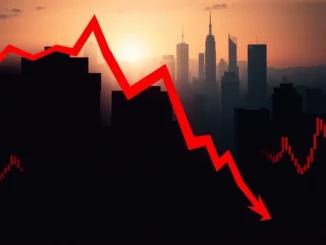
Concerned about the recent market activity? Today’s trading session brought a sea of red as all three major U.S. stock market indices concluded the day in negative territory. Let’s dive into what happened and what this could mean for investors, especially those watching both traditional markets and the cryptocurrency space.
Decoding the Stock Market Close Lower: A Snapshot of Today’s Trading
The day’s trading painted a picture of cautious sentiment as investors reacted to a mix of economic data and ongoing global uncertainties. Here’s a quick rundown of how the major indices fared:
- S&P 500: The broad market index, representing 500 of the largest U.S. companies, saw a decline of -0.17%. While not a dramatic plunge, any dip in the S&P 500 is closely watched as a barometer of overall market health.
- Nasdaq Composite: The tech-heavy Nasdaq Composite experienced a slight decrease of -0.05%. Given the Nasdaq’s sensitivity to interest rate changes and growth expectations, this marginal dip could reflect investor hesitancy in the technology sector.
- Dow Jones Industrial Average: The Dow Jones, composed of 30 blue-chip companies, took the biggest hit among the three, closing down by -0.38%. This suggests that established, more traditional industrial stocks faced stronger headwinds today.
| Index | Daily Change |
| S&P 500 | -0.17% |
| Nasdaq Composite | -0.05% |
| Dow Jones | -0.38% |
While these percentage drops might appear modest individually, the collective stock market close lower across these key indices signals a broader trend of investor caution. But what factors contributed to this downturn?
Why Did the Major Indices Experience a Market Downturn Today?
Pinpointing the exact reason for a daily market fluctuation is often complex, but several factors likely played a role in today’s market downturn. These could include:
- Economic Data Releases: Recent economic reports, such as inflation figures, employment numbers, or consumer spending data, can heavily influence market sentiment. If data suggests a slowing economy or persistent inflation, investors may become more risk-averse.
- Interest Rate Expectations: Anticipation of future interest rate hikes or pauses by the Federal Reserve is a major market driver. Higher interest rates can make borrowing more expensive for companies and reduce consumer spending, potentially impacting corporate earnings and stock valuations.
- Geopolitical Events: Global events, ranging from political instability to international trade tensions, can inject uncertainty into the market. Such events often lead investors to seek safer assets, pulling capital away from equities.
- Profit Taking: After periods of market gains, some investors may engage in profit-taking, selling off stocks to secure returns. This can contribute to downward pressure on prices.
- Sector-Specific News: Developments within specific sectors, such as technology, energy, or healthcare, can also impact overall market performance. Negative news or outlooks in a major sector can drag down the broader indices.
Impact on Investors: Navigating a Lower Stock Market Close
For investors, a stock market close lower can evoke a range of emotions, from mild concern to heightened anxiety, depending on portfolio composition and investment strategy. Here’s what investors should consider:
- Portfolio Diversification: A diversified portfolio, spread across different asset classes and sectors, can help mitigate the impact of a downturn in any single area. Diversification is a fundamental risk management strategy.
- Long-Term Perspective: Daily market fluctuations are normal. Long-term investors should focus on the fundamental strengths of their investments and avoid making impulsive decisions based on short-term market noise.
- Dollar-Cost Averaging: For those regularly investing, a market downturn can present buying opportunities. Dollar-cost averaging, investing a fixed amount regularly regardless of market levels, allows investors to buy more shares when prices are lower.
- Review and Rebalance: Periods of market volatility are good times to review portfolio allocations and rebalance if necessary to maintain desired risk levels.
- Stay Informed: Keeping abreast of market news and economic developments is crucial for making informed investment decisions.
Broader Market Implications and the Crypto Connection
While today’s stock market close lower is specific to traditional equities, it’s important to consider the broader market context, especially for those involved in cryptocurrencies. Traditional markets and crypto markets are not entirely isolated. Investor sentiment and macroeconomic factors can spill over between these realms.
For instance, if concerns about economic growth or inflation are driving the stock market downturn, these same concerns can influence cryptocurrency markets. Risk-off sentiment in traditional markets can sometimes translate to reduced appetite for riskier assets like cryptocurrencies.
Conversely, at times, cryptocurrencies have acted as a hedge against traditional market uncertainties, though this correlation is not always consistent. Therefore, understanding the dynamics in the S&P 500, Nasdaq Composite, and Dow Jones can provide valuable insights into broader market trends that may indirectly affect the crypto space.
Key Takeaways and Actionable Insights
- Today’s Market Summary: Major U.S. stock indices – S&P 500, Nasdaq, and Dow Jones – all closed lower, indicating a cautious market sentiment.
- Potential Downturn Factors: Economic data, interest rate expectations, geopolitical events, and profit-taking could be contributing factors to the market downturn.
- Investor Considerations: Diversification, a long-term perspective, and staying informed are crucial strategies for navigating market fluctuations.
- Crypto Market Connection: While distinct, traditional and crypto markets are interconnected. Sentiment and macroeconomic factors influencing stock markets can have ripple effects on cryptocurrencies.
In Conclusion: Navigating Market Fluctuations with Awareness
The stock market close lower today serves as a reminder of the inherent volatility in financial markets. While daily fluctuations are part of the investment landscape, understanding the underlying factors and maintaining a well-informed and balanced approach is key to navigating these changes effectively. Whether you’re primarily focused on traditional stocks or the exciting world of cryptocurrencies, staying informed and adaptable is your greatest asset in the ever-evolving financial markets.



